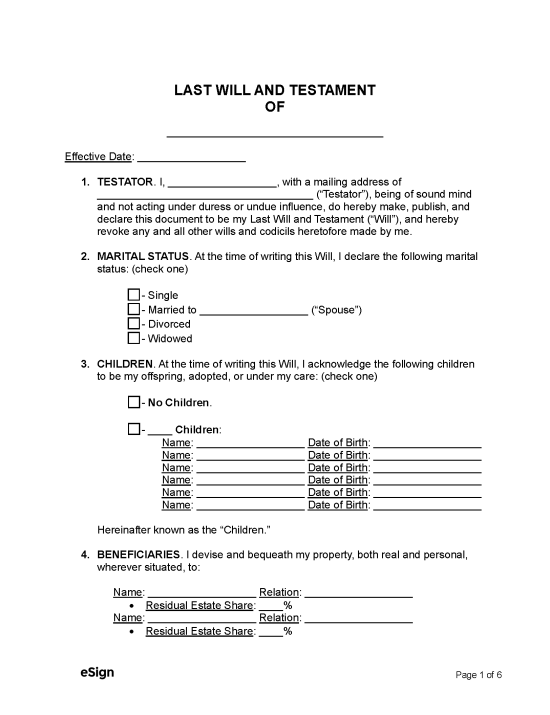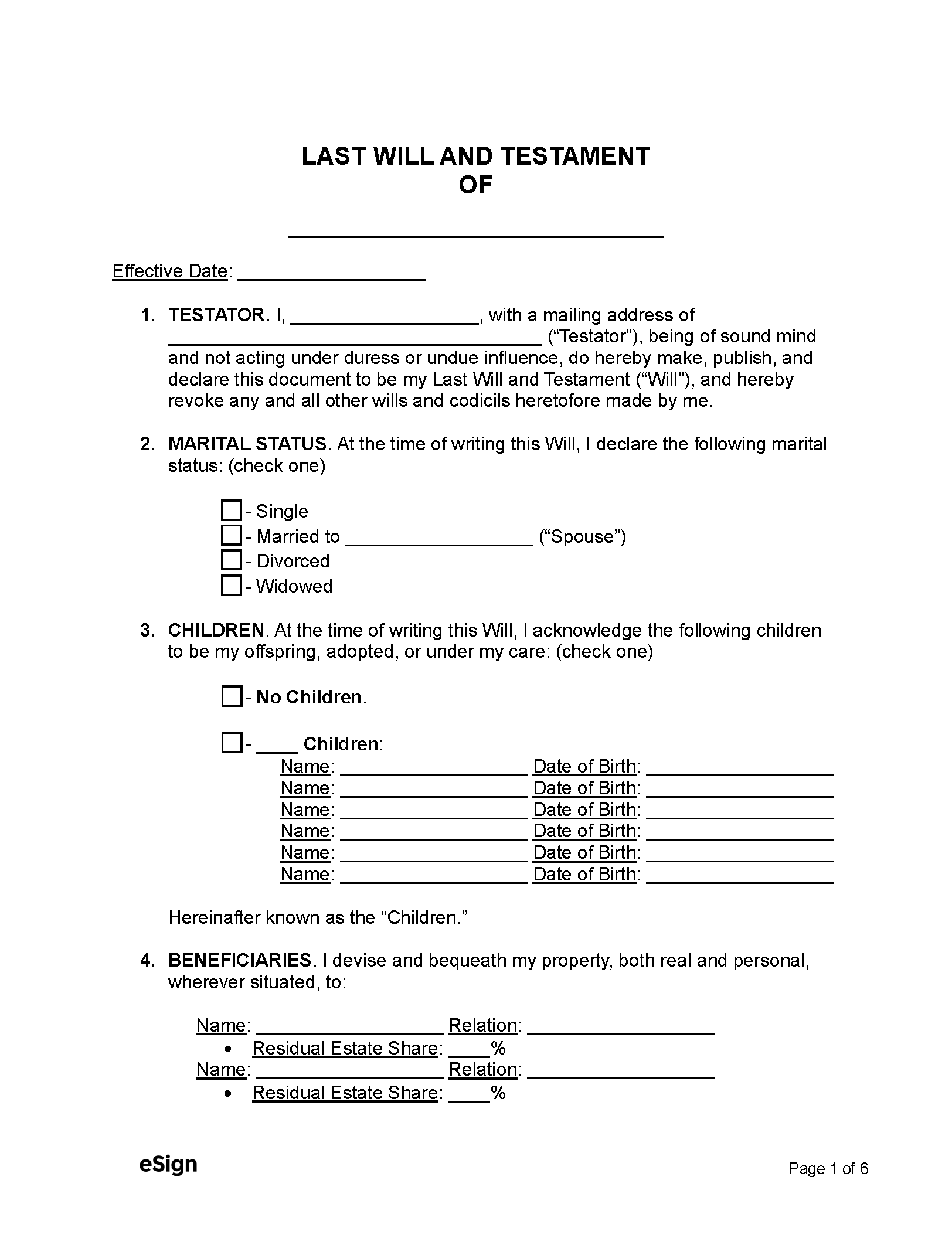Signing Requirements
In all states, a will must be signed by two witnesses to be legally binding. Louisiana is the only state that requires notarization.
Who can be a Witness?
A witness must be at least 18 years old and be of sound mind. In most states, a person who benefits from the will, such as a spouse or named beneficiary, cannot act as a witness.
By State
- Alabama
- Alaska
- Arizona
- Arkansas
- California
- Colorado
- Connecticut
- Delaware
- Florida
- Georgia
- Hawaii
- Idaho
- Illinois
- Indiana
- Iowa
- Kansas
- Kentucky
- Louisiana
- Maine
- Maryland
- Massachusetts
- Michigan
- Minnesota
- Mississippi
- Missouri
- Montana
- Nebraska
- Nevada
- New Hampshire
- New Jersey
- New Mexico
- New York
- North Carolina
- North Dakota
- Ohio
- Oklahoma
- Oregon
- Pennsylvania
- Rhode Island
- South Carolina
- South Dakota
- Tennessee
- Texas
- Utah
- Vermont
- Virginia
- Washington
- West Virginia
- Wisconsin
- Wyoming
Contents |
Sample
Download: PDF, Word (.docx), OpenDocument
LAST WILL AND TESTAMENT OF
[TESTATOR NAME]
Effective Date: [MM/DD/YYYY]
1. TESTATOR. I, [FULL NAME], with a mailing address of [ADDRESS] (“Testator”), hereby declare this document to be my Last Will and Testament (“Will”), and I revoke any prior wills and codicils I have made.
2. FAMILY. At the time of writing this Will, I acknowledge the following family members:
Marital status: ☐ Single ☐ Married to [NAME] (“Spouse”) ☐ Divorced ☐ Widowed
Children: ☐ None ☐ [#] children:
Name: [NAME] DOB: [MM/DD/YYYY]
Name: [NAME] DOB: [MM/DD/YYYY]
Name: [NAME] DOB: [MM/DD/YYYY]
Name: [NAME] DOB: [MM/DD/YYYY]
The “Children.”
3. BENEFICIARIES. I devise and bequeath my property, both real and personal, to:
Name: [NAME] Relation: [RELATION] Residual Estate Share: [%]
Name: [NAME] Relation: [RELATION] Residual Estate Share: [%]
Name: [NAME] Relation: [RELATION] Residual Estate Share: [%]
Name: [NAME] Relation: [RELATION] Residual Estate Share: [%]
The “Beneficiaries.”
4. PERSONAL REPRESENTATIVE. I appoint [NAME] with a mailing address of [ADDRESS] (“Personal Representative”) to be my executor of this Will and exercise legal powers such as buying/selling/managing property, resolving claims and settling debts, taking out loans, filing and paying taxes, distributing the estate, and hiring professionals to assist in their duties.
Personal Representative shall receive ☐ no compensation ☐ compensation in the following manner: [TYPE OF PAYMENT].
5. PREDECEASED PARTIES. If any of the Beneficiaries predecease me, their portion of the estate shall be distributed:
☐ Equally to the remaining Beneficiaries.
☐ Equally to my heirs at law.
☐ [DISTRIBUTION PLAN]
6. SURVIVORSHIP. No person shall be deemed to have survived me if such person shall die within thirty days after my death.
7. DIGITAL ASSETS. I direct that my Personal Representative handle any digital assets I may have regarding social media profiles or any other online accounts.
8. SEVERABILITY. In the event that any provision of this Will is deemed to be
invalid, illegal, or unenforceable, such determination shall not affect the validity, legality, or enforceability of the remaining provisions of this Will, all of which shall remain in full force and effect.
9. GOVERNING LAW. This document shall be governed by and under the laws of the state in which I reside at the time of death.
Signature ________________________ Date: [MM/DD/YYYY]
Print Name: [NAME]
Related Forms (5)

Download: PDF, MS Word, OpenDocument
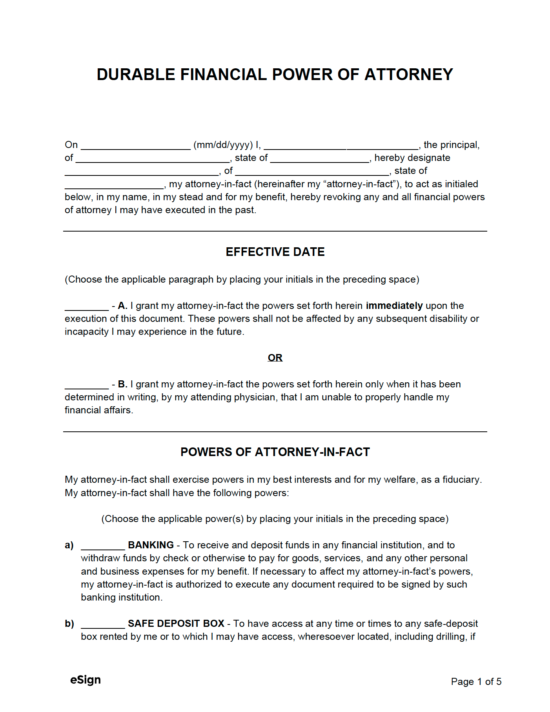
Download: PDF, MS Word, OpenDocument
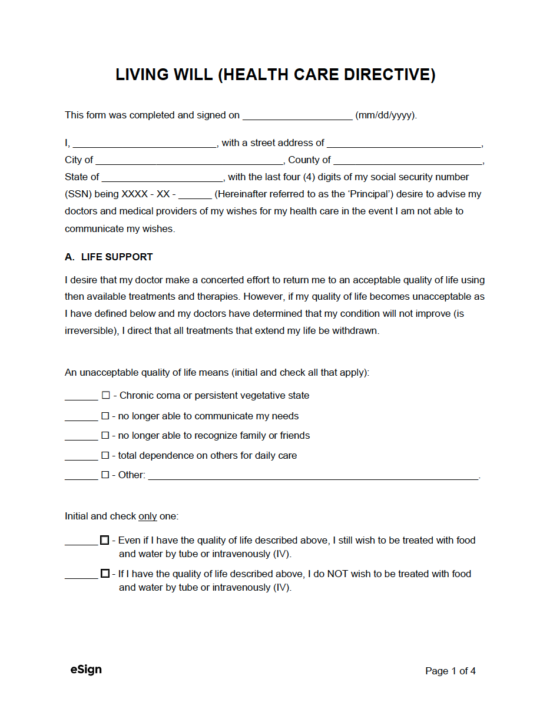
Download: PDF, MS Word, OpenDocument
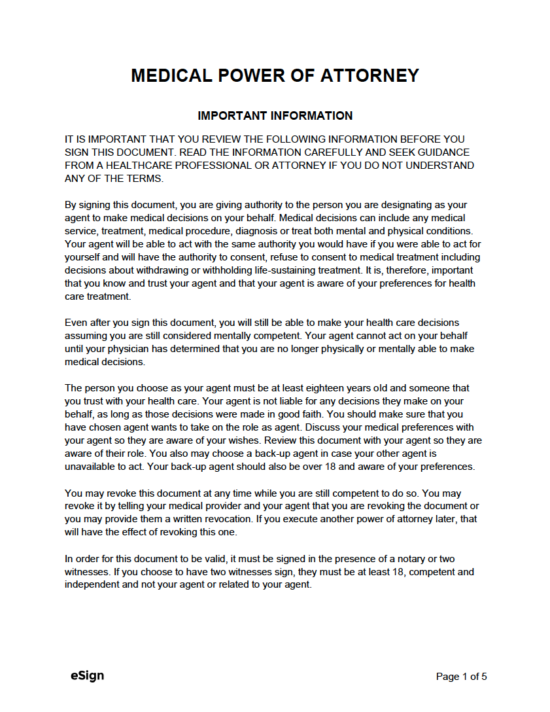
Download: PDF, MS Word, OpenDocument
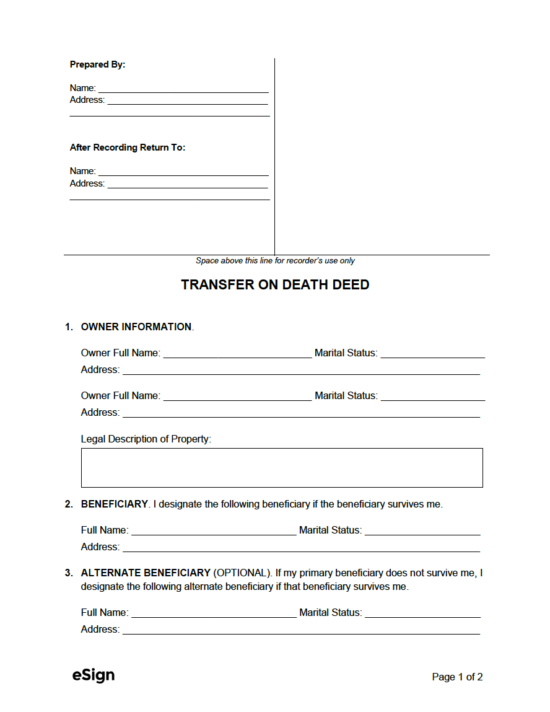
Download: PDF, MS Word, OpenDocument
Minor Children
If the testator has children, a guardian can be mentioned in a will as the preferred caretaker. It’s important to note that a guardian named in a will is under no legal obligation to take on this responsibility.
Furthermore, a testamentary trust can be included in a testator’s will for the their minor or incapacitated children. This trust allows money to be distributed to beneficiaries when they reach a certain age.
Glossary
- Beneficiary – A person who will receive property, cash, or other assets as mentioned in a will.
- Decedent – The term typically used for the testator (person who created the will) after they die.
- Devisee – Another term for a beneficiary, i.e., an individual or entity that receives assets from a person’s estate through a will.
- Estate – Entirety of property and assets that a person owns upon their death.
- Guardian – A person appointed by a testator to care for their minor children after death.
- Heir – A person who will legally inherit another person’s assets if they die intestate (typically children, descendants, or close relatives).
- Holographic Will – A handwritten will that typically does not require witnesses and is often created without the aid of legal counsel.
- Intestate – Dying without a will.
- Personal Representative – Also known as an executor, this is an individual appointed by the testator to manage and distribute their estate after death.
- Predeceased – When someone dies before someone else; commonly used when a beneficiary dies before the testator.
- Probate – The court process that approves a will and allows the property to be disbursed.
- Residuary Estate – The part of a deceased’s estate after debts are paid and special bequests have been made.
- Special Bequest – When the testator requests specific property to be given to certain individuals.
- Testator – The person who creates a will.
- Testamentary Trust – This type of trust is established by a will but is created after the testator’s death to hold assets to be distributed to named beneficiaries once predetermined conditions are met (e.g., minor children turning a certain age.)
- Trustee – An individual appointed to manage a trust, commonly on behalf of a child.
Is a Holographic (Handwritten) Will Legal?
While the specific requirements may vary by state, there are currently 28 states that consider holographic (handwritten, unwitnessed) wills to be legal and valid.
| STATE | LEGAL? | STATUTE |
| Alabama | No | N/A |
| Alaska | Yes | § 13.12.502(b) |
| Arizona | Yes | § 12-2503 |
| Arkansas | Yes | § 28-25-104 |
| California | Yes | § 6111 |
| Colorado | Yes | § 15-11-502(2) |
| Connecticut | No | N/A |
| Delaware | No | N/A |
| Florida | No | N/A |
| Georgia | No | N/A |
| Hawaii | Yes | § 560:2-502(b) |
| Idaho | Yes | § 15-2-503 |
| Illinois | No | N/A |
| Indiana | No | N/A |
| Iowa | No | N/A |
| Kansas | No | N/A |
| Kentucky | Yes | § 394.040 |
| Louisiana | Yes | § 1575 |
| Maine | Yes | § 2-502(2) |
| Maryland | Yes | § 4-103 |
| Massachusetts | No | N/A |
| Michigan | Yes | § 700.2502(2) |
| Minnesota | No | N/A |
| Mississippi | Yes | § 91-5-1 |
| Missouri | No | N/A |
| Montana | Yes | § 72-2-522(2) |
| Nebraska | Yes | § 30-2328 |
| Nevada | Yes | § 133.090 |
| New Hampshire | No | N/A |
| New Jersey | Yes | § 3B:3-2(b) |
| New Mexico | No | N/A |
| New York | Yes | § 3-2.2(b), (c) |
| North Carolina | Yes | § 31-3.4 |
| North Dakota | Yes | § 30.1-08-02(2) |
| Ohio | No | N/A |
| Oklahoma | Yes | § 84-54 |
| Oregon | No | N/A |
| Pennsylvania | No | N/A |
| Rhode Island | No | N/A |
| South Carolina | No | N/A |
| South Dakota | Yes | § 29A-2-502 |
| Tennessee | Yes | § 32-1-105 |
| Texas | Yes | § 251.052 |
| Utah | Yes | § 72-2-502(2) |
| Vermont | No | N/A |
| Virginia | Yes | § 64.2-403 |
| Washington | No | N/A |
| West Virginia | Yes | § 41-1-3 |
| Wisconsin | No | N/A |
| Wyoming | Yes | § 2-6-113 |
